|
|
|
Sort Order |
|
|
|
Items / Page
|
|
|
|
|
|
|
| Srl | Item |
| 1 |
ID:
120021
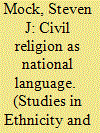

|
|
|
| 2 |
ID:
099700
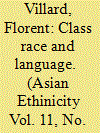

|
|
|
|
|
| Publication |
2010.
|
| Summary/Abstract |
This study investigates the discursive peregrinations of the 'Han' category in the writings of the Chinese revolutionary, theoretician and activist Qu Qiubai. In the papers he wrote at the beginning of the 1930s dealing with the questions of language and writing, the author made singular use of the concept 'Han' to talk about the language/writing of the 'Han' (Hanzi, Hanyu) as a racial or ethnic group (Hanzu). Qu elaborated a discourse which articulated and mobilized, sometimes in a contradictory manner, the 'Han' category both as a 'race' and as a social class. Going beyond the race/class dialectic, I will try to show that these texts question the territorial, cultural and ethnic boundaries of 'China' and its homogeneity. Following this argument, this paper demonstrates how Qu's attempt to define 'Chinese language(s)' helps us to elucidate the complex articulation between China as a discursive and spatial category, the 'Han' category, and the other nationalities in the Chinese space. By questioning the homogeneity of the linguistic identity of China, using the word zhongguohua, Qu Qiubai unveiled an unstable and fragile imaginary relative to China and its so-called majority ethnic group, the Han.
|
|
|
|
|
|
|
|
|
|
|
|
|
|
|
|
| 3 |
ID:
144148
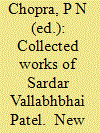

|
|
|
|
|
| Publication |
New Delhi, Konark Publishers Pvt Ltd, 2015.
|
| Description |
xxx, 325p.hbk
|
| Contents |
Vol. XIV (1 January 1949 - 31 December 1949): Sardar Patel supports membership of Commonwealth, stresses need for wider role in other countries, assures
princes of privy purses, praises services for their patriotic role, stresses uniform
code of law, reservation for scheduled castes for ten years only, Hindi to be
national language within ten years, elaborates his economic policy.
|
| Standard Number |
9789322008444
|
|
|
|
|
|
|
|
|
|
|
|
Copies: C:1/I:0,R:1,Q:0
Circulation
| Accession# | Call# | Current Location | Status | Policy | Location |
| 058597 | 954.035/CHO 058597 | Main | On Shelf | Reference books | |
|
|
|
|
| 4 |
ID:
119969
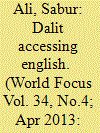

|
|
|
| 5 |
ID:
143317
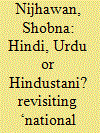

|
|
|
|
|
| Summary/Abstract |
Asking how the nationalist intelligentsia and Hindi literati sought to interact with and shape the new medium of radio in a period of time that witnessed the establishment of All India Radio’s Lucknow station in 1938, this article embeds colonial discussions of radio broadcasting into the cultural, literary and linguistic debates over Hindi, Urdu and Hindustani. The vibrant debate on the standardisation of Hindi, set against the background of All India Radio policies, is discussed from the perspective of those literary actors and institutions that envisioned diverse oral forms of Hindi and Hindustani for the rural and urban population residing in the Hindi belt and the rest of India. In addition, the article compares the radio broadcasting language to other contributions published in Hindi to show how languages operated not only in parallel but also in intersecting literary spheres. The article shows that language debates over radio broadcasting functioned as a site to probe the flexibility of what was to be officially projected as the language of the nation-to-be.
|
|
|
|
|
|
|
|
|
|
|
|
|
|
|
|
| 6 |
ID:
094001
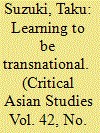

|
|
|
|
|
| Publication |
2010.
|
| Summary/Abstract |
Scholars and practitioners of heritage language education commonly hold two assumptions about heritage language: first, that heritage language is an official national language of a nation-state from which group originally migrated; and second, that heritage language is a vulnerable language on the verge of getting swept away by the national language of the nation-state of a migrant's current residence. This article questions these two assumptions by examining Japanese language education and speech practices among Okinawan-Bolivians in a rural agricultural community called Colonia Okinawa. Okinawan-Bolivians' heritage language education and speech practices suggest that immigrants who were marginalized in the nation-states of their migratory/ancestral origin, like Okinawans, consciously transform their linguistic heritage from a sub-national one to a national one in order to gain socioeconomic advantages in their migratory destination. Furthermore, when immigrant community leaders deem the international standing of the country of their migratory origin higher than their host country's status, such as Okinawan- Bolivian leaders in Colonia Okinawa, they regard heritage language education as a crucial means to maintain their community members' political, economic, and symbolic powers over other local residents. By ethnographically portraying the ways in which Japanese is taught and spoken in Colonia Okinawa, this article highlights the shifting scales and locations of the immigrant community's "ancestral homeland" and draws attention to the multiple meanings of the language the community designates as its "heritage."
|
|
|
|
|
|
|
|
|
|
|
|
|
|
|
|
| 7 |
ID:
105496
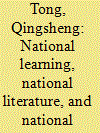

|
|
|
|
|
|
|
|